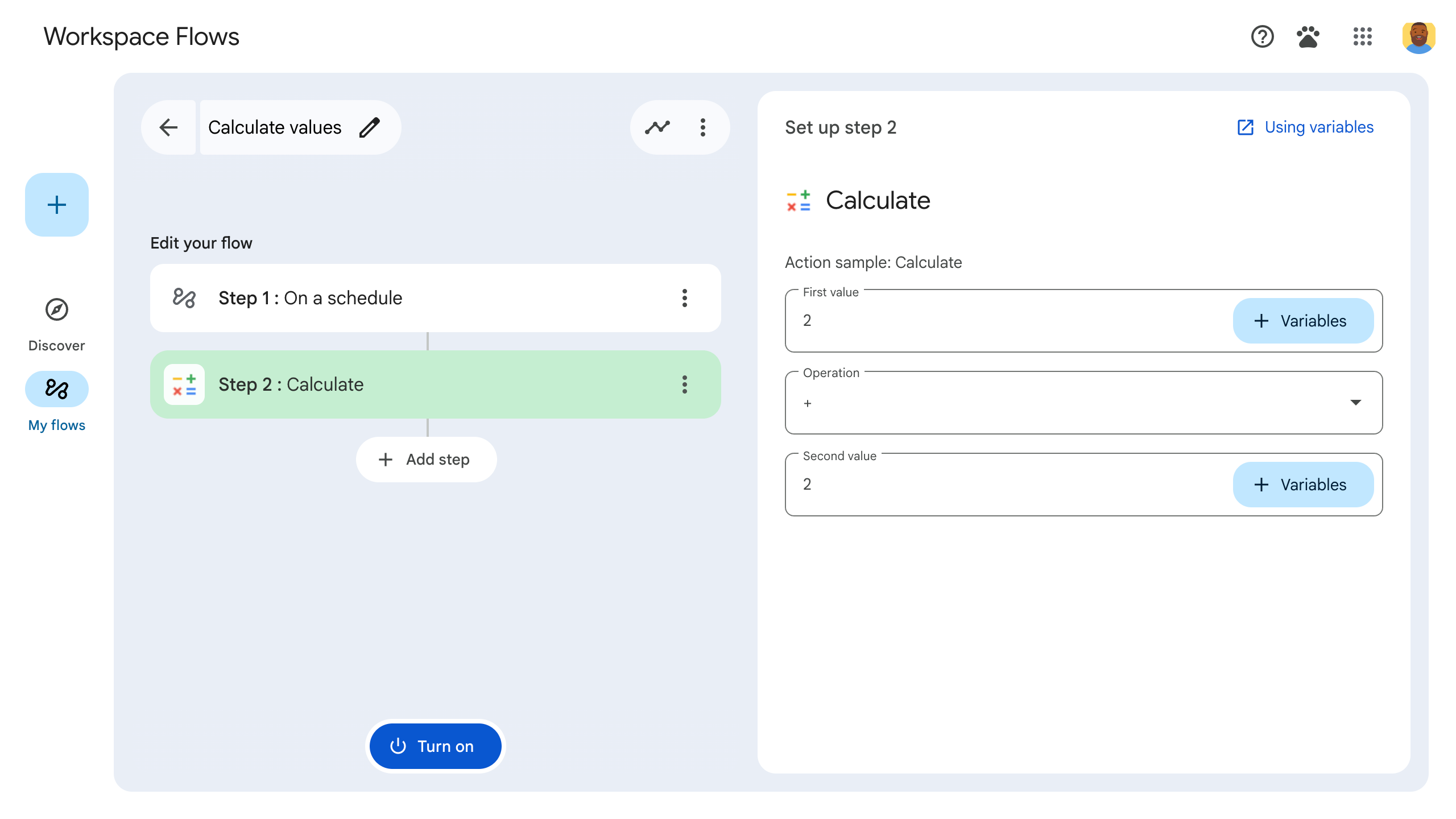本指南說明如何建立步驟,供使用者新增至 Google Workspace Flows 的流程。
步驟是流程中一系列工作中的單一步驟。步驟無法啟動流程。
舉例來說,假設某個步驟會執行算術運算。這個函式會要求使用者提供兩個值和一項數學運算。然後對這些值執行數學運算,並輸出結果。

如要建構步驟,請在外掛程式的資訊清單檔案中設定步驟,在 Google Workspace 外掛程式的程式碼中編寫應用程式邏輯,然後部署及測試步驟。在 Alpha 版期間,請勿發布擴充 Flows 的外掛程式。
定義步驟
如要設定步驟,請在資訊清單檔案中定義步驟,並在程式碼中編寫應用程式邏輯。
在資訊清單檔案中定義步驟
在資訊清單檔案中,appsscript.json:
- 將
onConfigFunction和onExecuteFunction設為外掛程式碼中對應函式的名稱。在本範例中,函式稱為onConfigCalculate()和onExecuteCalculate()。onConfigFunction會設定及設定步驟。如有必要,請從使用者收集執行步驟所需的資料,例如傳送電子郵件的地址。在本指南的範例中,我們會要求兩個值和一項數學運算。onExecuteFunction執行步驟。如果資料是從使用者收集而來,該資料會傳遞至這個函式。如果適用,則會傳回輸出內容。在本指南的範例中,輸出數學計算結果。
設定必要輸入和輸出內容,讓步驟收集資料並傳送至後續步驟。在本範例中,請向使用者索取兩個值,以及
inputs[]中定義的數學運算。根據outputs[]輸出計算結果。
以下是「計算機」步驟的資訊清單檔案:
JSON
{
"timeZone": "America/Los_Angeles",
"exceptionLogging": "STACKDRIVER",
"runtimeVersion": "V8",
"addOns": {
"common": {
"name": "Calculator",
"logoUrl": "https://www.gstatic.com/images/branding/productlogos/calculator_search/v1/web-24dp/logo_calculator_search_color_1x_web_24dp.png",
"useLocaleFromApp": true
},
"flows": {
"workflowElements": [
{
"id": "actionElement",
"state": "ACTIVE",
"name": "Calculate",
"description": "Asks the user for two values and a math operation, then performs the math operation on the values and outputs the result.",
"workflowAction": {
"inputs": [
{
"id": "value1",
"description": "value1",
"cardinality": "SINGLE",
"dataType": {
"basicType": "INTEGER"
}
},
{
"id": "value2",
"description": "value2",
"cardinality": "SINGLE",
"dataType": {
"basicType": "INTEGER"
}
},
{
"id": "operation",
"description": "operation",
"cardinality": "SINGLE",
"dataType": {
"basicType": "STRING"
}
}
],
"outputs": [
{
"id": "result",
"description": "Calculated result",
"cardinality": "SINGLE",
"dataType": {
"basicType": "INTEGER"
}
}
],
"onConfigFunction": "onConfigCalculate",
"onExecuteFunction": "onExecuteCalculate"
}
}
]
}
}
}
接著,請在程式碼中定義步驟,編寫支援程式碼。
在程式碼中定義步驟
在應用程式程式碼中,請執行下列操作:
撰寫
onConfigFunction,在本例中稱為onConfigCalculate()。 使用者將步驟新增至流程後,即可在流程建構工具中設定步驟的各個層面。如要向使用者收集必要資訊,onConfigFunction會定義設定卡片。資訊卡是外掛程式使用者介面的建構元素。資訊卡支援定義的版面配置、按鈕等互動式 UI 元素,以及圖片等多媒體。您可以使用資訊卡從使用者取得步驟執行所需的資料,例如傳送電子郵件時的電子郵件地址。
OnConfigFunction會傳回包含資訊卡的RenderActions物件。這張卡片定義了使用者設定步驟資料的 UI。在這個範例中,onConfigFunction會建構一張卡片,要求使用者提供兩個值和數學運算。在本例中,請編寫名為
onExecuteFunction的onExecuteCalculate()。 當步驟在流程中執行時,系統會執行OnExecuteFunction。使用者在設定期間設定的任何輸入值 (如onConfigurationFunction中所定義),都會傳遞至OnExecuteFunction。編寫
OnExecuteFunction(),以便使用提供的輸入內容同步執行工作。請注意,OnExecuteFunction()必須傳回流程資訊清單中定義的所有輸出內容,否則會發生錯誤。
這個程式碼範例包含支援函式 outputVariables(),可建構並傳送提供的變數做為步驟的輸出內容。
您的步驟已可供測試。
以下是「計算機」步驟的程式碼:
Apps Script
/**
* Generates and displays a configuration card for the sample calculation step.
*
* This function creates a card with input fields for two values and a drop-down
* for selecting an arithmetic operation. The card also includes a "Save"
* button to save the step configuration for the workflow.
*
* The input fields are configured to let the user select outputs from previous
* workflow steps as input values using the `hostAppDataSource` property.
*/
function onConfigCalculate() {
var card = {
"sections": [
{
"header": "Step example: Calculate",
"widgets": [
{
"textInput": {
"name": "value1",
"label": "First value",
"hostAppDataSource" : {
"workflowDataSource" : {
"includeVariables" : true
}
}
}
},
{
"selectionInput": {
"name": "operation",
"label": "Operation",
"type": "DROPDOWN",
"items": [
{
"text": "+",
"value": "+",
},
{
"text": "-",
"value": "-",
},
{
"text": "x",
"value": "x",
},
{
"text": "/",
"value": "/",
}
]
}
},
{
"textInput": {
"name": "value2",
"label": "Second value",
"hostAppDataSource" : {
"workflowDataSource" : {
"includeVariables" : true
}
}
}
}
]
}
]
};
return {
"action": {
"navigations": [{
"push_card": card
}]
}
};
}
/**
* Returns output variables from a step.
*
* This function constructs an object that, when returned, sends the
* provided variable values as output from the current step.
* The variable values are logged to the console for debugging purposes.
*/
function outputVariables(variableValues) {
var renderAction = {
"hostAppAction" : {
"workflowAction" : {
"returnOutputVariablesAction" : {
"variables" : variableValues
}
}
}
};
console.log("renderAction: " + JSON.stringify(renderAction));
return renderAction;
}
/**
* Executes the calculation step based on the inputs from a flow event.
*
* This function retrieves input values and the operation from the flow event,
* performs the calculation, and returns the result as an output variable.
* The function logs the event for debugging purposes.
*/
function onExecuteCalculate(event) {
console.log("output: " + JSON.stringify(event));
var calculatedValue = 0;
var value1 = event.workflow.actionInvocation.inputs["value1"].integerValues[0];
var value2 = event.workflow.actionInvocation.inputs["value2"].integerValues[0];
var operation = event.workflow.actionInvocation.inputs["operation"].stringValues[0];
if (operation == "+") {
calculatedValue = value1 + value2;
} else if (operation == "-") {
calculatedValue = value1 - value2;
} else if (operation == "x") {
calculatedValue = value1 * value2;
} else if (operation == "/") {
calculatedValue = value1 / value2;
}
return outputVariables([{
"variableId": "result",
"variableData": {
"integerValues": [
calculatedValue
]
},
}]);
}
測試步驟
如要測試步驟,請為外掛程式設定測試部署作業,將步驟新增至流程,然後執行流程。
為外掛程式設定測試部署作業:
- 在 Apps Script 編輯器中開啟指令碼專案。
- 依序點選「部署」>「測試部署作業」。
- 按一下 [安裝]。
- 按一下底部的「完成」。
您可以與其他使用者的帳戶共用 Apps Script 專案 (必須具備編輯權限),讓他們測試外掛程式。然後提示使用者按照先前的步驟操作。
安裝完畢後,外掛程式會立即顯示在 Flows 中。您可能需要重新整理 Flows,外掛程式才會顯示。您也必須先授權外掛程式,才能使用。
如要進一步瞭解測試部署作業,請參閱「安裝未發布的增益集」。
開啟「流程」。
建立包含步驟的流程:
- 按一下「新增流程」。
- 選取流程的啟動方式。測試步驟時,建議選擇可自行觸發的啟動器,例如傳送電子郵件給自己。如果步驟需要輸入變數,請將輸入變數設定為啟動器的輸出內容。
- 按一下「新增步驟」。選取您建立或更新的步驟,稱為「計算」。
- 設定步驟。在計算步驟中,選擇兩個值和數學運算。系統會自動儲存步驟。
- 如要測試步驟的輸出內容,請新增另一個步驟。舉例來說,如要在電子郵件中新增輸出內容,可以新增 Gmail 的「傳送郵件」步驟。在「訊息」中,按一下「變數」,然後選取步驟的輸出內容。在計算步驟中,依序選取「變數」 >「步驟 2:計算結果」 >「計算結果」。變數會以方塊形式顯示在「訊息」欄位中。
- 按一下「開啟」。流程已可執行。
如要執行流程,請啟動流程的啟動條件。舉例來說,如果流程會在收到電子郵件時啟動,請傳送電子郵件給自己。
確認流程是否正常運作。前往流程建構工具的「活動」分頁,即可查看記錄。如要瞭解如何在「活動」分頁中建立自訂記錄,請參閱活動記錄。
